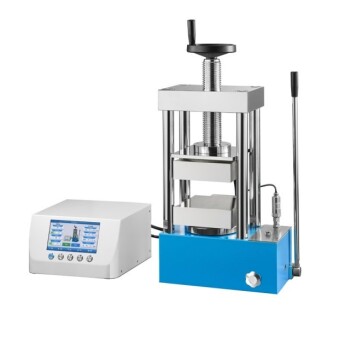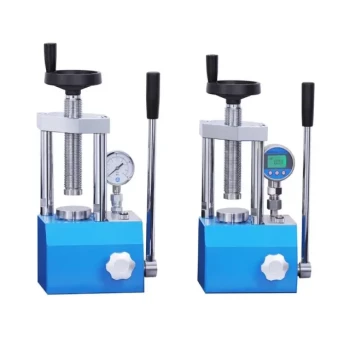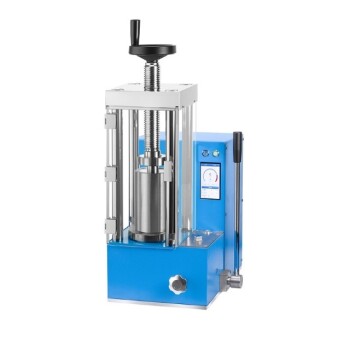At its core, a hydraulic press is used for any industrial task that requires the application of immense, controlled force. This includes a vast range of applications, from shaping automotive body panels and forging metal tools to compacting ceramic powders and recycling scrap metal.
The true value of a hydraulic press lies not just in its raw power, but in its ability to deliver that power with precision and consistency. This unique combination makes it a cornerstone technology for forming, molding, assembling, and testing materials across nearly every industrial sector.

The Core Principle: Pascal's Law in Action
How Immense Force is Generated
A hydraulic press operates on a simple but powerful principle known as Pascal's Law. This law states that pressure applied to a confined fluid is transmitted undiminished throughout the fluid.
In a press, a small force is applied to a small piston in a sealed hydraulic system. This generates pressure in the hydraulic fluid, which then acts on a much larger piston, multiplying the initial force significantly. This force multiplication is what allows the press to perform tasks like crushing a car with relative ease.
Precision Force Control
Unlike purely mechanical presses that follow a fixed stroke, a hydraulic press offers complete control over the pressure throughout the entire process. The force, speed, and ram position can be precisely managed, which is critical for complex forming operations and delicate assembly tasks.
Key Applications in Manufacturing and Metalwork
Metal Forming and Shaping
This is the most common use for hydraulic presses. The controlled force is ideal for transforming metal billets and sheets into finished or semi-finished parts.
Key processes include forging (shaping metal with compressive force), stamping (creating parts like car doors), bending, and deep drawing (forming cup-shaped parts).
Assembly and Joining
Hydraulic presses are essential for assembling components that require significant force to join.
This includes press-fitting bearings into housings, inserting shafts, and performing operations like riveting and crimping where a permanent, high-strength connection is needed.
Shearing, Cutting, and Straightening
The immense force generated by hydraulic systems is also used for cutting thick metal plates through shearing and punching. They are also used to straighten large metal beams or shafts that have been bent or warped.
Beyond Metal: Molding, Compacting, and Bonding
Powder Compacting
Many industries, from ceramics and metallurgy to pharmaceuticals, use hydraulic presses to compact powdered materials into solid forms. The even pressure ensures a uniform density, which is critical for creating high-quality parts like grinding wheels or medical tablets.
Compression Molding
For materials like plastics and rubber, hydraulic presses are used in compression molding. A pre-measured amount of material is placed in a heated mold cavity, and the press applies pressure to force the material to conform to the mold's shape.
Laminating, Bonding, and Composites
Hydraulic hot presses, which combine heat and pressure, are used for tasks like laminating surfaces, bonding different materials together, and curing composite materials. They are used in electronics manufacturing to solder components and in aerospace to create strong, lightweight composite panels.
Specialized and High-Force Applications
Scrapping and Recycling
The raw power of hydraulic presses is perfectly suited for scrap baling, where scrap metal is compacted into dense, manageable blocks for transport and recycling. Larger presses are famously used for crushing entire cars.
Material and Component Testing
In laboratory and quality control settings, hydraulic presses are used to test the tensile strength and compressive strength of materials like concrete or steel. This helps ensure materials meet required safety and performance standards.
Niche Production
The versatility of the hydraulic press extends to unique applications. It's used to extract fat from cocoa beans to produce fat-free cocoa powder and has even been employed by modern blacksmiths for the precision forging of high-quality swords.
Understanding the Trade-offs
Power vs. Speed
The primary trade-off with hydraulic presses is speed. They are generally slower than their mechanical counterparts, which can impact cycle times in very high-volume production environments.
System Complexity
Hydraulic systems rely on fluids, pumps, motors, and seals. This introduces a need for regular maintenance to prevent leaks and ensure consistent performance, which can be more involved than maintaining a purely mechanical system.
Footprint and Cost
The equipment needed to generate high hydraulic pressure—including the pump, motor, and reservoir—can result in a larger physical footprint and a higher initial investment compared to some mechanical press alternatives.
Making the Right Choice for Your Goal
- If your primary focus is high-force forming and shaping: A hydraulic press is the ideal choice for forging, deep drawing, and working with tough or thick materials where immense, controlled pressure is paramount.
- If your primary focus is precision assembly: The ability to precisely control force and ram position makes hydraulics perfect for press-fitting bearings or other components without causing damage.
- If your primary focus is material processing or molding: A hydraulic press, especially a hot press, provides the uniform pressure and temperature control needed for compacting powders, molding plastics, or creating composite materials.
- If your primary focus is extremely high-volume, simple stamping: A mechanical press may offer faster cycle times for repetitive tasks that do not require the nuanced force control of a hydraulic system.
Ultimately, the hydraulic press remains an indispensable tool in modern industry precisely because it provides a scalable and controllable solution for applying force.
Summary Table:
| Application Area | Key Processes | Industries Benefited |
|---|---|---|
| Metal Forming | Forging, Stamping, Bending | Automotive, Aerospace |
| Assembly | Press-fitting, Riveting | Manufacturing, Electronics |
| Powder Compacting | Uniform Density Creation | Ceramics, Pharmaceuticals |
| Molding | Compression Molding, Laminating | Plastics, Composites |
| Recycling | Scrap Baling, Car Crushing | Waste Management |
| Testing | Tensile and Compressive Strength | Laboratories, Quality Control |
Ready to enhance your lab's capabilities with reliable hydraulic presses? KINTEK specializes in lab press machines, including automatic lab presses, isostatic presses, and heated lab presses, designed to meet your precise force and temperature needs. From metal forming to material testing, our equipment ensures consistent performance and durability. Contact us today to discuss how we can support your laboratory and industrial applications!
Visual Guide

Related Products
- Automatic Laboratory Hydraulic Press Lab Pellet Press Machine
- 24T 30T 60T Heated Hydraulic Lab Press Machine with Hot Plates for Laboratory
- Laboratory Hydraulic Press Lab Pellet Press Button Battery Press
- Manual Heated Hydraulic Lab Press with Integrated Hot Plates Hydraulic Press Machine
- Manual Laboratory Hydraulic Press Lab Pellet Press
People Also Ask
- How are hydraulic presses used in the preparation of powder mixtures? Achieve Precise Compaction for Accurate Analysis
- How are hydraulic pellet presses used in educational and industrial settings? Boost Efficiency in Labs and Workshops
- What are the limitations of hand-operated presses? Avoid Sample Compromise in Your Lab
- How do hydraulic pellet presses contribute to material testing and research? Unlock Precision in Sample Prep and Simulation
- What are the key steps for making good KBr pellets? Master Precision for Flawless FTIR Analysis



















